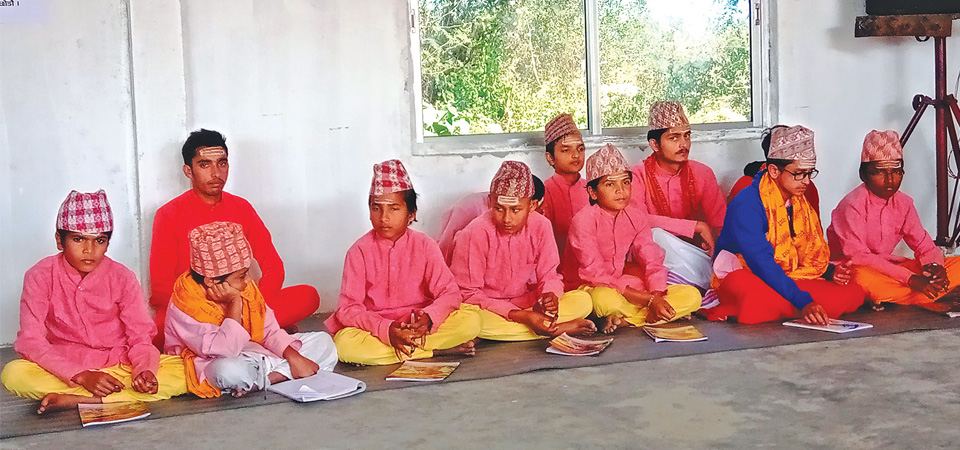Back to Gurukul school to learn Sanskrit

By Hari Prasad Koirala
Urlabari, Dec. 29: It has been a year since 12-year-old Sheetal Bhandari, who resides in his maternal home in Damak, Jhapa, joined Gurukul to learn Sanskrit language.
Bhandari, who switched to Gurukul after completing fifth grade in a private English school, is completing the Rudri and the Chandi soon. His father has been missing for a long time while his mother resides in Kathmandu doing odd jobs.
“It was very difficult to learn Sanskrit in the initial days. But now that I have got a hang of it, I feel like staying here in Gurukul,” said Bhandari, who belongs to a lower-middle class of Brahmin family.
Like Bhandari, a total of 25 boys have joined Ved Vyas Vaidyik Sanaatan Gurukul in Urlabari-6, Morang, with a dream to become a Pandit. Of them, 15 reside in Gurukul itself and the remaining 10 students return home after attending classes for four to five hours.
Fourteen-year-old Madav Prasad Nepal, a student at the Gurukul, said that his father was inspired from his uncle who is a Pandit and admitted him to Gurukul.
Nepal had also studied in a private school until fifth grade. He is also learning to study the Rudri and the Chandi, two religious texts of the Hindus.
Similarly, Tuvraj Koirala and Yagyaraj Koirala are brothers and their father is a Pandit in Mahalaxmi Municipality-4 in Dhankuta district. Their father sent them to Gurukul stating that Brahmans should preserve and promote the eastern philosophy.
Fifteen-year-old Yagyaraj said, "We do not have priests in our village even to perform ordinary rituals. But, the trend of performing Puja and rituals has increased in comparison to the past. Thus, our father sent us to the Gurukul so that we can become priests in the future."
Durgamani and Bhawani Prasad Ghimire are also siblings and their father is also a priest. The Ghimire brothers, who hail from Madirambeni in Sankhuwasabha, also took admission in the Gurukul with an aim to become priests. Durga, 17, joined the Gurukul after completing grade eight while his 15-year-old brother Bhawani switched to Gurukul after completing grade five.
"After understanding the importance of Sanskrit education, which is not only limited to performing rituals, we decided to study in Gurukul," said Durgamani.
These are representative stories of students at Gurukul and there are numerous students who have joined the institution tosecure their future by becoming self-employed. However, the institution providing Sanskrit education is weak in itself.
There are only two teachers at the Gurukul who teach the Chandi, the Rudri, Laghukaumudi and other rituals to the students.
While the Sanskrit and Gurukul education is not being prioritised by most people in current scenario, Siddheswar Shiva Baba Dham in Urlabari-6 introduced Gurukul education from April 14, 2019. Chairman of the Dham Durga Prasad Khatiwada said, "The Maharshimehi Foundation has been paying the salary of one teacher in Gurukul while the salary to the other teacher has been managed by Baba Dham itself."
By creating a sub-committee, the Dham has been funding all the expenses required for the Gurukul.
Khatiwada said that the Gurukul was being operated with the grants from the donors.
Recent News

Do not make expressions casting dout on election: EC
14 Apr, 2022
CM Bhatta says may New Year 2079 BS inspire positive thinking
14 Apr, 2022
Three new cases, 44 recoveries in 24 hours
14 Apr, 2022
689 climbers of 84 teams so far acquire permits for climbing various peaks this spring season
14 Apr, 2022
How the rising cost of living crisis is impacting Nepal
14 Apr, 2022
US military confirms an interstellar meteor collided with Earth
14 Apr, 2022
Valneva Covid vaccine approved for use in UK
14 Apr, 2022
Chair Prachanda highlights need of unity among Maoist, Communist forces
14 Apr, 2022
Ranbir Kapoor and Alia Bhatt: Bollywood toasts star couple on wedding
14 Apr, 2022
President Bhandari confers decorations (Photo Feature)
14 Apr, 2022











